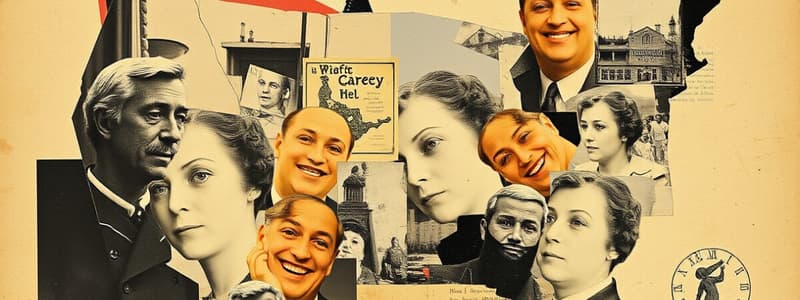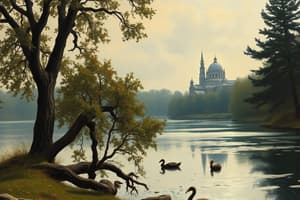Podcast
Questions and Answers
What is the Ice Age?
What is the Ice Age?
- The age of dinosaurs
- A period of global warming
- A phase in the evolution of man
- An extended period when glaciers covered most of North America (correct)
What was the staple crop that formed the economic foundation of Indian civilizations?
What was the staple crop that formed the economic foundation of Indian civilizations?
Corn (Maize)
What is Cahokia?
What is Cahokia?
Important Mississippian culture site near present-day East St. Louis, Illinois
Which European nation was the first to send explorers around the west coast of Africa?
Which European nation was the first to send explorers around the west coast of Africa?
What was the capital of the flourishing West African kingdom of Mali?
What was the capital of the flourishing West African kingdom of Mali?
The term 'Indies' referred to American lands because explorers believed they reached Asia.
The term 'Indies' referred to American lands because explorers believed they reached Asia.
What transformed the Indian way of life on the Great Plains?
What transformed the Indian way of life on the Great Plains?
What disease originated in the Americas and affected Europeans after 1492?
What disease originated in the Americas and affected Europeans after 1492?
What was the Treaty of Tordesillas?
What was the Treaty of Tordesillas?
Who is referred to as a Mestizo?
Who is referred to as a Mestizo?
What was Pope's Rebellion?
What was Pope's Rebellion?
Who were the Pueblos?
Who were the Pueblos?
Who were the Spanish Franciscans?
Who were the Spanish Franciscans?
Who financed Columbus' voyages to the New World?
Who financed Columbus' voyages to the New World?
Who were Cortes and Pizarro?
Who were Cortes and Pizarro?
What is Lake Bonneville?
What is Lake Bonneville?
Who were Dias and da Gama?
Who were Dias and da Gama?
Who was Columbus?
Who was Columbus?
Who was Malinche?
Who was Malinche?
Who was Montezuma?
Who was Montezuma?
Who was Hiawatha?
Who was Hiawatha?
What was Tenochtitlan?
What was Tenochtitlan?
What is St. Augustine?
What is St. Augustine?
Who was John Cabot?
Who was John Cabot?
Who was Junipero Serra?
Who was Junipero Serra?
What nation employed brutal tactics against Catholics in Ireland?
What nation employed brutal tactics against Catholics in Ireland?
What happened to the Roanoke Island colony?
What happened to the Roanoke Island colony?
What was the Spanish Armada?
What was the Spanish Armada?
What were the 1st and 2nd Powhatan Wars?
What were the 1st and 2nd Powhatan Wars?
What were slave codes?
What were slave codes?
What is a Royal Charter?
What is a Royal Charter?
What are indentured servants?
What are indentured servants?
What is the Iroquois Confederacy?
What is the Iroquois Confederacy?
Who are squatters?
Who are squatters?
What is a royal colony?
What is a royal colony?
Flashcards are hidden until you start studying
Study Notes
Geographic and Historical Terms
- Ice Age: Period marked by extensive glacier coverage across North America.
- Lake Bonneville: An ancient inland sea from melting glaciers; remnants form the Great Salt Lake.
- Indies: Incorrectly named by early European explorers, mistakenly associating American lands with Asia.
Indigenous Cultures
- Corn (Maize): Essential crop that served as a foundation for various Native American civilizations.
- Cahokia: Significant Mississippian cultural site located near present-day East St. Louis, Illinois.
- Pueblos: Indigenous people from the Rio Grande Valley, oppressed by Spanish conquerors.
- Iroquois Confederacy: Strong coalition of several Native American nations dominating New York and the Great Lakes.
European Exploration and Colonization
- Portugal: First European nation to explore the west coast of Africa.
- Treaty of Tordesillas: Agreement dividing the New World between Spain and Portugal to prevent conflicts over territory.
- Columbus: Italian explorer who mistakenly believed he reached Asia instead of the New World.
- John Cabot: Italian navigator exploring North America's coast under English patronage in 1498.
Notable Figures
- Ferdinand and Isabella: Spanish monarchs who financed Columbus' voyages.
- Cortes and Pizarro: Spanish conquistadors responsible for the downfall of major Native American civilizations.
- Malinche: Indigenous woman who acted as interpreter for Cortes, facilitating Spanish conquest.
Disease and Its Impact
- Syphilis: Disease originating in the Americas that spread to Europe post-1492.
- Spanish Franciscans: Religious order establishing missions in California to spread Christianity.
Conflicts and Uprisings
- Pope's Rebellion: Native American revolt in New Mexico against Spanish religious oppression in 1609.
- 1st and 2nd Powhatan Wars: Conflicts (1614 and 1644) between English settlers in Jamestown and local Native leaders.
Colonial Developments
- Royal Charter: Document granting rights to set up colonies and protections for settlers.
- Royal Colony: Colony directly controlled by the English monarchy; settled under royal authority.
- Indentured Servants: Individuals entering unpaid labor agreements for a number of years, typically in exchange for passage to America.
Societal Structures
- Mestizo: Individuals of mixed European and Indigenous ancestry.
- Slave Codes: Legal frameworks governing the treatment and rights of enslaved Africans, first established in Barbados.
Other Notable locations
- Tenochtitlan: The prosperous capital of the Aztec Empire, notable for its wealth and advanced society.
- St. Augustine: The oldest continuously inhabited European settlement in present-day U.S., founded by the Spanish in 1565.
- Roanoke Island: Site of the first attempted English colony that vanished mysteriously in the 1580s.
Cultural Exchange
- Horse: The introduction of this animal by Europeans transformed Native American life, particularly on the Great Plains.
Historical Events and Outcomes
- Spanish Armada: Naval fleet defeated by English forces in 1588, impacting the balance of power in Europe and the Americas.
Studying That Suits You
Use AI to generate personalized quizzes and flashcards to suit your learning preferences.




